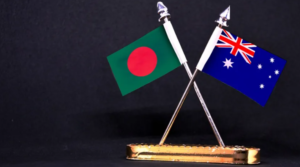Reimagining Australia-Bangladesh Ties from Recognition to Partnership
By Rajeev Ahmed
Australia’s image is often one of stunning beaches and bustling cities. But beneath the postcard-perfect veneer lies a complex history marked by dispossession, exploitation, and ongoing struggles for recognition. The arrival of Europeans in 1788 shattered millennia-old Aboriginal societies. The land, for so long nurtured by Indigenous custodianship, was declared terra nullius – a legal fiction that ignored the intricate web of relationships Aboriginal people had with the land. Colonization unleashed a wave of violence, dispossession, and cultural destruction. The Stolen Generations, the forcible removal of Aboriginal children from their families, stands as a stark reminder of this dark chapter.
The economic engine of early Australia was fueled by convict labor and the insatiable British demand for wool. This period laid the foundation for a hierarchical society with a strong emphasis on resource extraction. The gold rushes of the 19th century further cemented this model, attracting migrants but also exacerbating social inequalities.
Federation in 1901 marked a shift towards nation-building. However, the concept of a unified Australian identity often came at the expense of acknowledging the diversity within. The White Australia Policy, a discriminatory immigration restriction, aimed at creating a homogenous European society. This policy, dismantled only in the 1970s, left a lasting legacy of racial exclusion.
The 20th century saw Australia grapple with its place in the world. Its involvement in two World Wars cemented its ties with Britain, but also fostered a yearning for greater independence. The post-war years witnessed an economic boom fueled by immigration and resource development. However, this prosperity masked the ongoing marginalization of Indigenous Australians and the environmental toll of unrestrained development.
The latter half of the 20th century saw a critical reevaluation of Australian history. The landmark Mabo decision in 1992 recognized the existence of native title, a significant step towards reconciliation with Indigenous Australians. However, the fight for justice and self-determination continues.
Australia’s engagement with Asia has also grown in recent decades. This shift reflects a more nuanced understanding of the nation’s geographical and cultural location. Yet, challenges remain in navigating complex geopolitical realities and forging genuine partnerships.
From a Bangladeshi perspective, gratitude for Australia’s early recognition of their independence in 1972 is undeniable, especially considering the hesitation of many Western nations at the time. Australia’s ongoing development assistance in education, infrastructure, and climate change adaptation is also deeply appreciated.
However, the relationship remains imbalanced. Trade heavily favors Australia, with limited access for Bangladeshi goods to the Australian market. While the potential for a Free Trade Agreement (FTA) excites some, concerns linger. Bangladeshis fear Australian dominance and a potential influx of cheap goods that could cripple their own industries.
Bangladesh is no longer simply a nation reliant on aid. It has transformed into a middle-income economy boasting a growing consumer base and a skilled workforce. From this vantage point, the traditional donor-recipient model feels outdated. Bangladesh seeks a more balanced partnership built on mutual respect and shared interests.
Greater Australian investment in Bangladeshi infrastructure, particularly in power generation and transportation, could create significant opportunities. Technology transfer in sectors like renewable energy could empower Bangladesh to develop sustainable solutions for its growing population. Joint ventures, especially in the crucial textile industry, could leverage Australian expertise to create high-value products for the global market. Streamlined visa processes for Bangladeshi professionals and students would benefit both nations.
Bangladesh’s skilled workforce could contribute to Australia’s economy, while Australian universities could provide valuable educational opportunities for Bangladeshi students.
One major point of contention is Australia’s stance on the Rohingya crisis. While some humanitarian aid has been provided, Bangladesh feels Australia could exert more pressure on Myanmar for a sustainable solution. The massive Rohingya refugee population burdens Bangladesh economically and socially, and a more robust Australian response is desired.
The Bangladeshi diaspora in Australia represents a vital bridge between the two nations. However, concerns exist regarding their social integration and recognition within Australian society. Initiatives fostering cultural exchange and inclusivity would strengthen people-to-people connections and enrich the relationship.
Just as Australia’s relationship with South Asia is marked by colonial legacies and evolving economic ties, its connection with Bangladesh reflects a similar complexity. Moving beyond the “aid narrative,” Australia needs to acknowledge Bangladesh’s growing economic and strategic significance.
Australia’s current geopolitical focus on the Indo-Pacific, fueled by China’s rise and the formation of the AUKUS pact (Australia, UK, US), raises concerns in Bangladesh. While not a direct player in the Indo-Pacific competition, Bangladesh is undeniably affected by regional tensions. Australia must ensure its strategic calculations do not overshadow the importance of a stronger relationship with Bangladesh.
The AUKUS pact, announced in 2021, signifies a strategic shift for Australia, prioritizing deterring China’s growing influence. While Bangladesh understands these security concerns, it worries about being caught in the crossfire of a potential US-China conflict. Increased regional tensions could disrupt trade and investment, hindering Bangladesh’s economic development.
Furthermore, Australia’s Indo-Pacific focus could divert resources away from crucial regional challenges like climate change. Bangladesh, a low-lying delta nation, is particularly vulnerable to rising sea levels and extreme weather events. Collaboration on climate change mitigation and adaptation strategies is essential for Bangladesh’s future.
However, there are promising signs of existing cooperation in the field of climate change adaptation. Australia supports of two Government of Bangladesh programs: The Bangladesh Climate Change Resilience Fund and the Comprehensive Disaster Management Program.
Looking beyond bilateral cooperation, regional organizations like the Association of Southeast Asian Nations (ASEAN) can play a vital role in facilitating closer ties. Bangladesh enjoys observer status in ASEAN, and fostering closer engagement within this framework could create opportunities for dialogue and collaboration on issues of mutual interest, such as maritime security and economic development.
With an eye to fortifying its Indo-Pacific strategy, Australia seeks to expand its South Asian engagement beyond its current focus on India. Bangladesh, a nation pulsating with economic potential and a population exceeding 160 million, is seen by Australia as a potential “Asian tiger” poised for a future leap. Recognizing its strategic stake in the northeast Indian Ocean’s stability, Australia is invested in maintaining maritime security and supporting regional nations against external pressure. To this end, Australia desires to cultivate a rapport with the Bangladeshi military through targeted exchanges and educational opportunities. Furthermore, Australia is keen to assist in bolstering Bangladesh’s maritime capabilities in select areas. These endeavors represent the core of Australia’s strategic interests centered on Bangladesh.
By acknowledging past imbalances, fostering a more equitable partnership through increased two-way trade and strategic investments that benefit both nations, and recognizing Bangladesh’s growing importance, Australia can build a stronger connection with a nation that is no longer just a recipient of aid, but a significant player in the region. This shift in perspective is essential for forging a future where both nations can truly thrive together.
——–
Rajeev Ahmed
The Author of Bengal Nexus, and the Editor of geopolits.com






